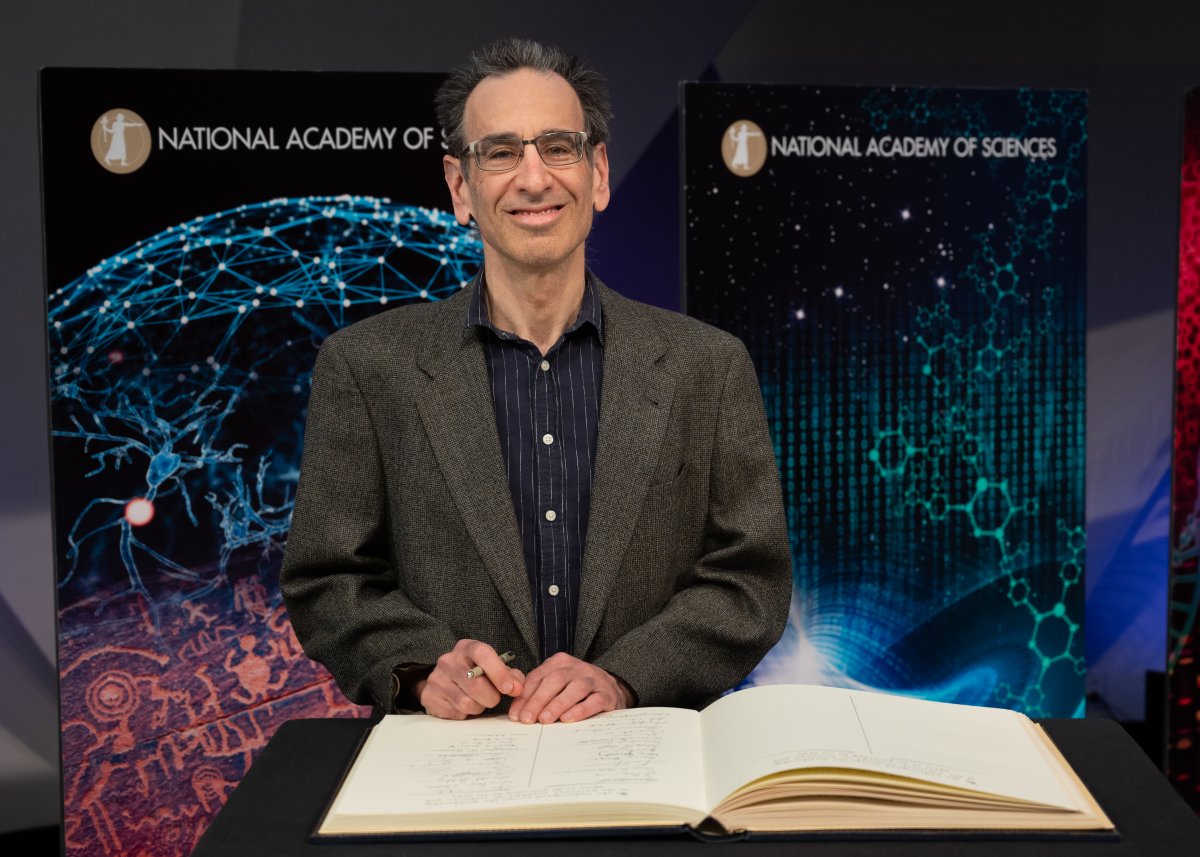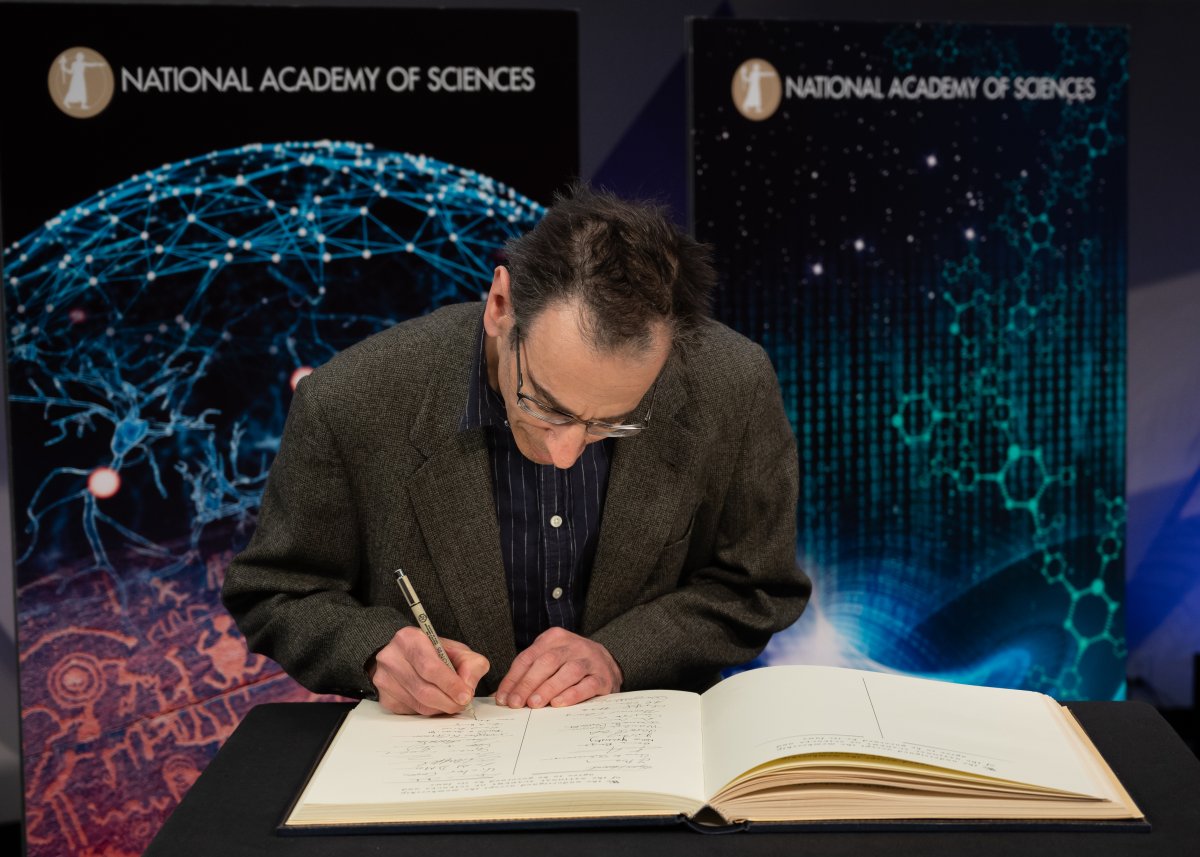Professor Hirschmann Inducted into the National Academy of Sciences


Professor Marc Hirschmann has received the prestigious honor of being inducted into the National Academy of Sciences. Dr. Hirschmann joins Drs. Lawrence Edwards (Professor) and David Kohlstedt (Emeritus Professor) as representative members from the Department of Earth & Environmental Sciences. The National Academy of Sciences (NAS) is a private, non-profit society of distinguished scholars. Established by an Act of Congress, signed by President Abraham Lincoln in 1863, the NAS is charged with providing independent, objective advice to the nation on matters related to science and technology. Scientists are elected by their peers to membership in the NAS for outstanding contributions to research.
Dr. Hirschmann received his PhD at University of Washington and moved on to a post-doctoral research position at Caltech. His time at the University of Washington was steeped in theory–considering the physical chemistry of geologic processes–while his time at Caltech was markedly more practical minded, focusing on high pressure and high temperature experimentation. After his arrival to the University of Minnesota in 1997 he continued to pursue answers to the questions was formulating as a post doc. Considering volcanic activity led to questioning the role of water and CO2 in volcanic activity, which then progressed to lines of inquiry directed more towards the composition of the Earth’s interior. Hichrmann recalls, “at the time they didn’t actually know how much water and how much carbon there was in the interior. But also, what’s the effect of these things? This became known as a series of studies around what are called Earthly Volatile Cycles”.
This work was still in its earliest stages making it a fantastic time to be contributing to the field. Earthly Volatile Cycles are key areas of research of those interested in planetary dynamics and were so significant at this time that they became central to the careers of many coming up in the field. In addition to individual contributions there has also been significant foundation investment in research labs and groups aiming to address these areas of study. The Deep Carbon Observatory is one such example. “Timing was very good,” said Hirschmann, for he and his lab to contribute to the work of Earthly Volatile Cycles. This comprised the first 10 years of Dr.Hirschmann’s work here in Minnesota.
From questions about the modern Earth, Hirschman transitioned to how the Earth began. Crucially, much of this time was spent investigating magma oceans–what we now understand to be the starting state of planets. Magma oceans were becoming relevant to academics from other disciplines including astronomers and astrophysicists. Hirschmann, again, was not the inventor of this concept but got involved in this work at a very pivotal moment. The timing was once again perfect. Hirschmann explained, “there is some inspiration in choosing the right problems, but I can’t tell you what they are because I wasn’t choosing them because I thought it was going to be this thing… I chose them because they were the next thing that interested me”.
“I used to have a web page where everybody else had a title: PhD student postdoc or whatever. My title was head cheerleader. I sort of saw myself that way because they were doing the work, and I was the person who was encouraging them. I mean I'd like to think that doing more than simply encouraging them, but a big part of the job is leading a group and helping other people who are at the beginning of their careers or in the middle of their careers by stimulating ideas of problems to work on.”
Timing cannot be the only detail credited for the success of Hirchmann’s research. He humbly explains, “the truth of the matter is that it was only very early in all of this, that I was deeply in the laboratory myself right. Since that time, my role has been in formulating the ideas and trying to understand the tools that we needed.” Hirschmann further elaborates, “My role is to have ideas and to understand the theory, and then to work as closely as I can, with the graduate students, postdocs, laboratory managers, research scientists, and collaborators from other institutions. It’s trying to formulate experimental strategies, analytical strategies and things like that, but the actual work, the laboratory work is done by my research group”. He further remembered, “I used to have a web page where everybody else had a title: PhD student postdoc or whatever. My title was head cheerleader. I sort of saw myself that way because they were doing the work, and I was the person who was encouraging them. I mean I'd like to think that doing more than simply encouraging them, but a big part of the job is leading a group and helping other people who are at the beginning of their careers or in the middle of their careers by stimulating ideas of problems to work on.”
Hirschmann greatly values taking on roles emphasizing leadership and mentorship. These same values can also be seen in his teaching. He currently teaches across the curriculum from 1001 courses and major courses to specialty courses aimed at graduate students specifically. However, in his own words “the course that I enjoy teaching the most, at the moment, is one that I began teaching very early when I came here–a course in planetary science…With my regrets to all the other classes that I teach which I care about, [Planetary Science] is by far the most fun of the classes. Planetary science is such an exploding field.”
Teaching, mentorship, and research have all been deeply affected by the pandemic. From courses becoming hybrid with many students and faculty being remote, to research labs needing to operate under strict distancing policies, preventing multiple people being in small labs at the same time. Hirchmann had to adjust all aspects of his work to meet the new conditions head on. He notes that some of the more detrimental impacts were those affecting students and their experience. “Covid has been really isolating for graduate students, especially those most junior.” In response, Hirschmann has shifted in his own words, “toward becoming much more focused on mental health,” choosing a more people focused approach to his role in the lives of others.
When asked about the importance of his induction to the academy, Hirschmann once again responded with humility. “It's very meaningful. It's an affirmation that I feel very grateful for. The people that I joined, who are already members of the National Academy are, in many cases, my heroes. They're people that I still don't really feel like I necessarily belong with, in that club or in that group… It is–I won't lie, it's a very good feeling but it's also a very humbling feeling.” Congratulations, once again, to Professor Marc Hirschmann, for this incredible achievement!